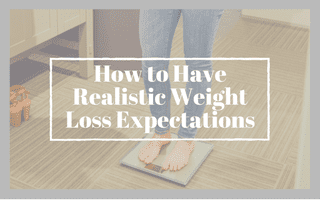The other day I went down an internet rabbit hole that led me to this article about the most common cause of divorce. The author believes it isn’t money, infidelity, or fights over Netflix queues.
So what did he claim it to be?
Unmet expectations.
To be honest, it kinda blew my mind a little bit. I guess I’d just never really thought about it but now that I am, it does seem that a lot of issues are caused by (often unvoiced) expectations going unmet and causing disappointment, frustration, and resentment.
As I mulled it over, I started to realize how applicable it was to my role as a personal trainer and nutrition coach.
One of the most common reasons that women give up on their body transformations is due to disappointment, frustration, and resentment at the fact that results may not be coming as quickly as they’d like.
So with this post, I hope to help you create realistic weight loss expectations, so that you will be more successful in your endeavors, rather than giving up due to disappointment, frustration, and resentment at a perceived lack of results.
Here are a few tips to help you have realistic weight loss expectations:
Be Wary of Poor Anchoring
Anchoring describes the common human tendency to rely too heavily on the first piece of information offered (the “anchor”) when making decisions. In the case of weight loss, we often “anchor” our expectations to anecdotal evidence (our brother’s-roommate’s-cousin’s-daughter-in-law who lost 100 pounds in 6 months) or reality TV (Biggest Loser contestants dropping 12 pounds a week) and start to think those are realistic weight loss goals for ourselves.
Nevermind the fact that Biggest Loser contestants are living on a ranch, eating the small meals they’re fed by a professional chef, exercising 6 hours a day with a trainer, and putting the rest of their lives on hold is not even remotely similar to your own circumstances.
Or the fact that it’s a lot easier to lose weight when you’re hundreds of pounds overweight than it is as you become smaller.
Circumstances vary and it’s not fair to yourself to base your own expectations off the experiences of other people. (It’s human nature, it’s not a character flaw, but it’s something you need to be aware of).
Understand Ballpark Estimates Are Just That
You’ve likely heard that you want to shoot for weight loss of 1-2 pounds per week. While this isn’t necessarily inaccurate, it is an oversimplification of a pretty complicated process. It’s an estimate but shouldn’t be considered a hard & fast rule.
This doesn’t take into account your starting weight or where you are on your weight loss journey. A 135-pound woman looking to drop 5 pounds and a 255-pound woman looking to drop 100 pounds are going to have very different weight loss journeys. They would be doing themselves a disservice to assume that a ballpark estimate was going to be their experience
Rough estimates don’t take into account your starting weight, lifestyle factors, weight loss history, or percentages of total bodyweight lost (ie a 150-pound woman losing 1 pound per week and a 300-pound woman losing 2 pounds per week are losing at the same rate).
Don’t Expect Linearity
To the same token, even if you do happen to be losing weight within the 1-2 pound per week range, it is unlikely to remain this way until you reach your weight loss goal.
Due to the fact that there are a whole myriad of factors that impact weight loss, it’s unrealistic to think that your journey will be perfectly linear.
Some weeks you might lose a pound, others half a pound, maybe 3 pounds in the post-period week (mostly water), and then no pounds the following week. THIS IS NORMAL. Do not freak out that it’s “not working” if this is your experience. It is. In fact, it’s working exactly how it should be for anyone living, breathing, human living outside lab conditions (and even then).
Understand the Give & Take
Some women lose weight faster than others. I’ve touched on a few of those reasons above. But one I haven’t mentioned (until now, duh) is that some women are willing to sacrifice more in order to lose weight.
I absolutely do not say this in an effort to make you feel like a POS if you’re not eating perfectly prepped meals 21 times per week or if you let the occasional shot of tequila pass between your lips (why does that sound so sexual?).
I say it to call attention to the fact that weight loss is a give & take and you need to be aware of the fact that the more you’re willing to do, the faster you will – most likely – see weight loss.
Take a look at your current lifestyle and the behaviors that you know aren’t doing you any favors with regards to losing weight. Again, I am not suggesting you eliminate them, I just want you to identify them.
If you are trying to lose weight but you’re unwilling to cut back on, or eliminate, nightly glasses of wine, weekly pizza dates & brunches, and ok-slightly-more-than-weekly happy hours, then you need to accept that your weight loss will be slower than if you were willing to make some changes to those things.
That’s the give & take.
Is it possible to still do those things and lose weight? Maybe. But you can’t expect to be losing very quickly when you’re not open to making changes to those behaviors that are likely playing a role.
Those who are willing to cut back on indulgences, rearrange schedules to find time for exercise and meal prep, and continue to prioritize their health day-in and day-out are more likely to lose weight faster than those who are not.
Remember that the scale is not the only way to gauge your progress. It’s entirely possible that you are moving in the right direction even if the scale isn’t cooperating.
The Progress Indicator Cheat Sheet bundle will give you tons of ideas of what to track besides your weight.
Focus On Behaviors, Not Just Outcomes
Outcomes are important. I know. You want to lose weight for a reason and you don’t want to be told to put that on the back burner.
But here’s the thing: we can’t control how quickly we lose weight. We just can’t. The human body is capable of incredible things, many of which we cannot see, control, or understand. But
they happen anyway.
Weight loss is one of those things. Your body doesn’t know or care if you have your heart set on losing 2 pounds per week so that you can lose 10 pounds before you go on vacation.
Rather than focusing on the actual weight loss, which you cannot control (just to reiterate), focus on the behaviors that will make you more likely to lose weight.
Focus on being active a certain number of minutes per day, days per week.
On getting veggies and lean protein at every meal.
Cutting back on processed or packaged foods.
Focus your time on actions that you can control.
The ideas above are a great start if you’re like, “ok, Esther, focus on actions, got it…but what?” But if you want even more info, including simple steps walking you through exactly what & how much you should be eating, and 30-days of at-home workouts, download your copy of the Body Transformation Guide today so you can get started!





